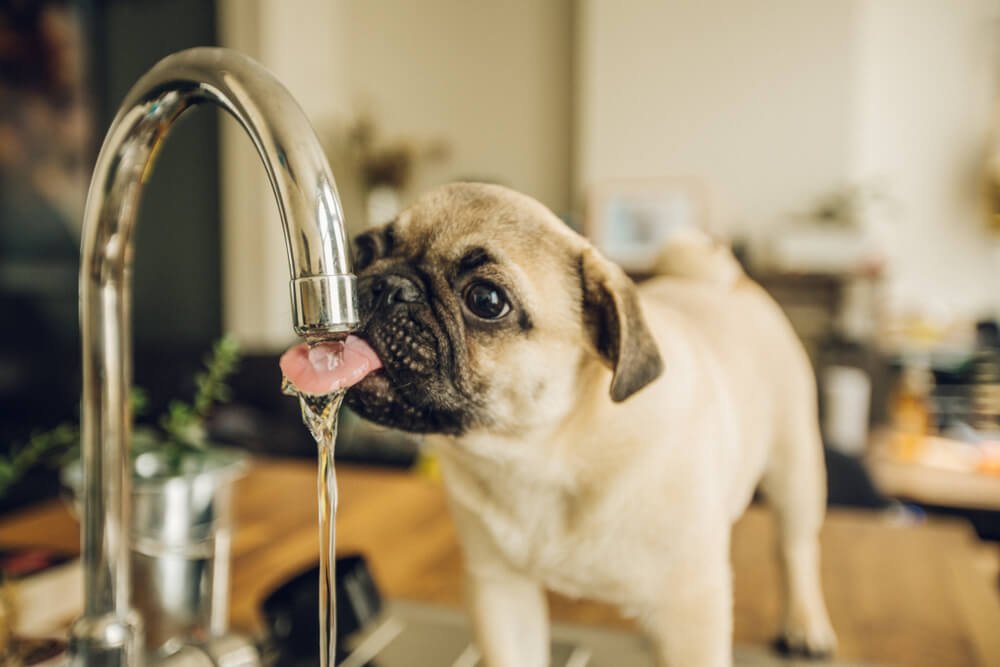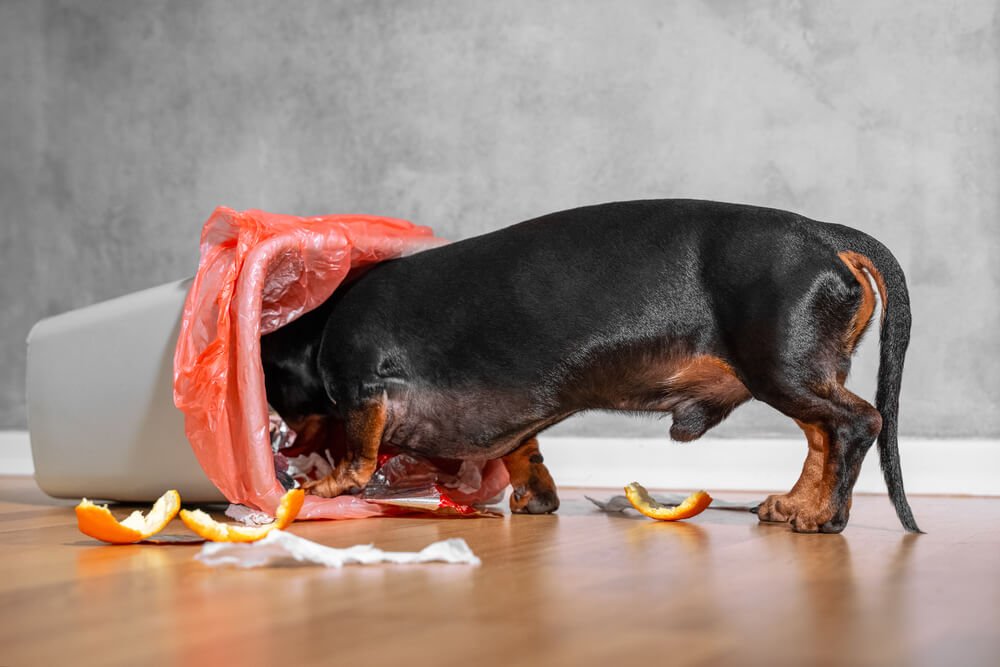Vomiting and diarrhea are common symptoms in our canine companions. Dogs eat all sorts of things like garbage and inedible items like toys so it’s no surprise that their tummies get upset every now and then. Many dogs will get a bout of vomiting or diarrhea (or one of these symptoms on their own) at least a few times in their lifetime. Most cases resolve quickly while others can be more serious. We’ll discuss the common causes of vomiting and diarrhea now and how to treat them.
Vomiting and Diarrhea Symptoms

Pay attention to the changes in your dog’s drinking habits since increased drinking or no drinking could be an important signal.
The most obvious symptoms in dogs will be vomiting and diarrhea together or separately. This is also known as gastroenteritis which is inflammation of the stomach and intestines. The majority of cases in dogs will resolve on their own or with minor treatment. Vomiting and diarrhea that isn’t resolving could be due to a more serious cause and will need veterinary treatment. Dogs can have other symptoms with this too (depending on the cause) such as:
- Reduced appetite
- Increased drinking or no drinking
- Lethargy
- Painful abdomen
- Change in behavior/temperament
- Absence of feces (no poops being produced)
- Nauseous – drooling, licking lips
It’s worth noting any other symptoms that your dog is displaying as it could indicate the cause which is especially important for severe cases or cases that aren’t resolving. For example, if your dog has stopped pooping your vet might be concerned about an obstruction in their intestines.
Apart from other symptoms that they might display it’s also important to pay attention to the vomiting and diarrhea itself. For example; when did it start? Has it gotten worse? How severe/frequent is it? These specifics about the vomiting and diarrhea might help us assess how serious the situation is and when we need to seek veterinary treatment. Things to look out for with vomiting include:
- What are they vomiting? E.g. food or bile
- How soon after food ingestion do they vomit?
- How many times have they vomited?
- What color is the vomit?
- Does it contain blood?
- Are they vomiting after drinking water?
- Are they empty retching?
In terms of diarrhea, it’s worth noting these specifics:
- Does the diarrhea have any form? What is the consistency?
- What color is the diarrhea?
- Does it contain blood? Blood can be bright red or very dark red/black.
- Does it contain mucous?
- Is there any urgency with the diarrhea?
- Is your dog straining to poop?
These might seem like quite specific questions but it’s important that you pay attention to your dog’s symptoms and know as much as possible. If you need to bring your dog to the vet they’ll appreciate all of this information and it will help them determine the cause of your dog’s upset tummy.
Causes of Vomiting and Diarrhea in Dogs

Dietary indiscretion (eating something they shouldn’t) could be one of the causes of your dog’s stomach issues.
Many bouts of vomiting and diarrhea will resolve themselves within 12-24 hours. Tummy upsets can have multiple causes ranging from mild to severe. Mild causes of vomiting and diarrhea include:
- Change of diet/poor quality diet
- Dietary indiscretion (eating something they shouldn’t)
- Stress e.g. a puppy moving to their new home
- After surgery in a veterinary clinic
More serious cases often need treatment from a veterinarian and may take longer to resolve. These causes include:
- Parasites
- Viruses e.g. parvovirus (puppies are particularly prone)
- Bacterial infections
- Bacterial overgrowth
- Poisoning/toxins e.g. chocolate
- Food allergies
- Inflammatory bowel disease
- Obstruction e.g. foreign body, intussusceptions
- Pancreatitis
- Liver disease
- Kidney disease
- Cancer
Many of the above conditions can cause persistent vomiting and diarrhea along with other symptoms and can even be contagious (parvovirus). They’ll need specific treatment from your veterinarian.
How to Treat Vomiting and Diarrhea in Dogs at Home
If your dog has mild vomiting and diarrhea and is otherwise well there are some treatments you can try at home. Firstly if they’re vomiting, you can withhold food and water for approximately 6 hours to give their stomach a break. Offer small amounts of food and water after this period and see if the vomiting continues after this break. I’d be hesitant to advise fasting for much longer as they can become easily dehydrated when they have vomiting and diarrhea.
If they’re still vomiting despite a break from food and water, you should see your veterinarian as soon as possible. Diarrhea can take a little bit longer to resolve but there should be a significant improvement by 12-24 hours and they should be able to keep food and water down.
You can feed them a bland diet as this can help to settle their tummy and shouldn’t irritate it any more than it already is. It should be fed little and often, 4-5 smaller meals throughout the day. Avoid feeding any treats or milk apart from the bland food as this could irritate their stomach and intestines more.
Prebiotics and probiotics can be helpful when treating upset stomachs. It puts good bacteria back into the gut which helps resolve the upset tummy. This particularly helps if there’s been a bacterial infection and antibiotics are used. Only buy these supplements from a reputable source, ideally, one recommended by your veterinarian.
Fiber supplements such as psyllium husk and pureed pumpkin can also be helpful but consult your vet about this, particularly if your dog has underlying conditions that cause constipation.
Avoid giving any human medications unless advised by your veterinarian. Many human medications are toxic to dogs and can be fatal if given at certain doses.
If you think your dog is stressed you can use a pheromone diffuser (Adaptil) to help. You can discuss calming medications or supplements with your vet.
When To Visit Your Vet
Many cases of vomiting and diarrhea will resolve within 12-24 hours. However, if it’s continuing after this period it’s advised to ring your veterinarian particularly if they’re displaying any other symptoms or if their case of vomiting and diarrhea is severe.
Dogs with underlying conditions e.g. diabetes or chronic kidney disease should visit their vet without delay. Some underlying conditions such as these will make your dog more prone to dehydration and electrolyte abnormalities and vomiting and diarrhea will only worsen this.
If you’re in any doubt call your veterinarian. They will examine your dog and they can do blood and urine testing to rule out underlying conditions e.g. kidney disease, liver disease, and pancreatitis. They might run fecal samples if they’re concerned about parasites. X-rays and an ultrasound exam may be warranted if your vet is concerned about an obstruction (foreign body), inflammatory bowel disease, or cancer. Your vet will investigate the cause and prescribe the medication that your dog needs.
How To Prevent Vomiting and Diarrhea in Your Dog

If your dog has a history of eating things like socks or toys, never leave them unsupervised with dog toys and tidy everything else out of their reach or put them in dog-proof cupboards.
Now that we know what causes vomiting and diarrhea in dogs, we have a better idea of how to prevent it. Even though most cases of vomiting and diarrhea will resolve quickly, other cases can be more serious so we want to prevent our dogs from getting sick at any cost.
One of the big things to prevent vomiting and diarrhea is to keep your dog healthy and fit. Dog foods that have a limited ingredient list are ideal as they are less likely to cause a tummy upset and also have fewer allergens to potentially trigger a food allergy. “You are what you eat” as the saying goes and this applies to our dogs too.
Be mindful of broken toys or sharp items that could be very harmful if your dog ate them. If your dog has a history of eating things like socks or toys, never leave them unsupervised with dog toys and tidy everything else out of their reach or put them in dog-proof cupboards.
To avoid parasites keep your dog up to date on their worming control treatment. This can be purchased from your veterinary clinic.
Conclusion
Vomiting and diarrhea is a common complaint in dogs and it’s usually caused by them eating something that’s upset their digestive system. Most cases resolve quickly but others can take longer and might have an underlying cause. If your dog’s vomiting and diarrhea aren’t resolving quickly or are particularly severe bring them to your veterinarian for a check-up. They can rule out things like parasites, an obstruction, or kidney and liver disease. Keep your dog’s worming treatment up to date and feed them a high quality dog food to try and prevent them from becoming unwell.
Frequently Asked Questions:
What should I do if my dog has diarrhea and vomiting?
Offer them a bland diet in small meals 4-5 times throughout the day. Continue to offer water and consider giving them a probiotic supplement from your vet.
When should I take my dog to the vet for vomiting and diarrhea?
If their symptoms haven’t improved within 12-24 hours you should bring them to the vet. You should bring them sooner if they’re displaying other symptoms such as; severe tummy pain, not drinking, lethargy or if there is blood in the vomit or feces.
What does it mean when your dog is having diarrhea and throwing up?
It means that your dog’s digestive system (stomach and intestines) is inflamed and irritated by something. It could be something that they’ve eaten or they might have an underlying condition.
How long do sickness and diarrhea last in a dog?
Mild cases will last 12-24 hours but more severe cases can last longer depending on the case. Visit your vet if it’s been over 24 hours or if they seem very unwell.



